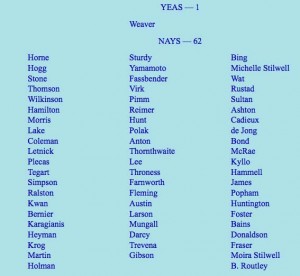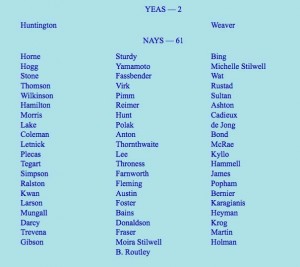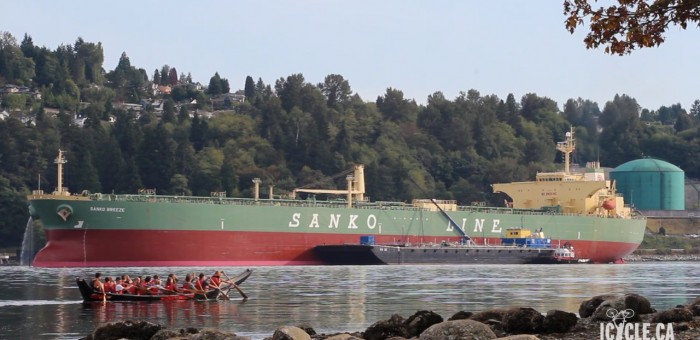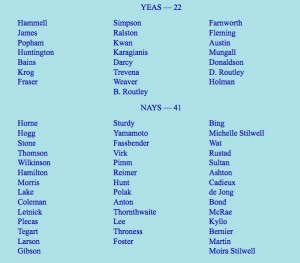Trying to Protect the BC coast from expansion of thermal coal & diluted bitumen exports
During the committee stage of Bill 12, The Federal Port Development Act on Thursday afternoon, I put forth a number of amendments in an attempt to protect the British Columbia coast from the expansion of thermal coal and heavy oil (diluted bitumen) exports. These were the amendments mentioned in my earlier post on Bill 12. All amendments were defeated. Below I provide a brief excerpt from Hansard.
First Amendment
A. Weaver: With respect to the minister, the reason I have troubles with this legislation is…. We are not debating the Canada Marine Act. I will come to that.
Under the Canada Marine Act, the federal government can sell federal land in a port to a port authority, which could be administered by the province of British Columbia. In selling the land to the port authority, the Species at Risk Act and the Canadian Environmental Assessment Act no longer have any jurisdiction because the land is no longer owned by the federal government. It is now within the port authority, administered by the province of British Columbia.
My concern, therefore, with respect to an undertaking is that heavy oil or thermal coal experts would then no longer have to worry about Species at Risk or Canadian Environmental Assessment Act implications in any development there. The problem with that is that we don’t have anything in the province of British Columbia as a Species at Risk Act.
In essence, what’s happening in accepting an agreement like this, through an undertaking involving either coal or heavy oil, as we will discuss in section 3, is we are essentially saying that we in British Columbia can exempt such development from the federal Species at Risk Act and we have nothing to fall upon here in British Columbia. We can fall on the Environmental Assessment Act.
Frankly, with respect to what we’ve seen with Kinder Morgan and Enbridge, the province has done an admirable job in terms of representing the interests of British Columbia. I have not seen that with respect to thermal coal, and for this reason I do have two amendments I would like to bring here to specifically exclude from ‘undertaking’.
[To amend as follows:
By adding the text shown as underlined:
Section 1
“undertaking” means an undertaking, or an undertaking in a class, designated for the purposes of section 64.1(2)(a) of the Canada Marine Act; excluding an undertaking, or an undertaking in a class, relating to the import or export of thermal coal.]
That is the first amendment I so move.
The Chair: The amendment was proposed by the member for Oak Bay–Gordon Head. It reads: “‘undertaking’ means an undertaking, or an undertaking in a class, designated for the purposes of section 64.1 (2)(a) of the Canada Marine Act, excluding an undertaking, or an undertaking in a class, relating to the import or export of thermal coal.”
Amendment negatived on the following division:

The Chair: Hon. Members, stay in your seats. The member is going to move another amendment.
Second Amendment
A. Weaver: As I mentioned earlier, I have a legal backgrounder from West Coast Environmental Law, which talks about the passage of Canada Marine Act, which we’re talking with respect to the “undertaking” definition here.
That would significantly increase the powers of port authorities, allow the federal government to off-load its responsibility over shipping in federal ports, etc. The changes now allow port authorities to buy federal land and infrastructure from the government and then lease those lands to companies or authorize companies to use them for as long as the port authority has control over them.
Once sold, those lands would no longer be federal property, meaning they would not be subject to terrestrial species protection under the Species at Risk Act.
Seeing as we have no species at risk act here in British Columbia, this raises some concern, which is why I move, again, an amendment to amend as follows:
[By adding the text shown as underlined:
Section 1
“undertaking” means an undertaking, or an undertaking in a class, designated for the purposes of section 64.1 (2)(a) of the Canada Marine Act excluding an undertaking or an undertaking in a class relating to the import or export of heavy oil.]
In light of the fact that we do not import heavy oil that probably is moot, but certainly export is a big issue that’s facing us now.
The Chair: Hon. Members, if the House waives the time we will proceed right away. Do we have consent?
Leave granted.
Amendment negatived on the following division:
Third Amendment
A. Weaver: Thank you to the minister for the answer. My concern here is that the province would enter an agreement and potentially get into a position where the Species at Risk Act is not applicable or in force. I have an amendment here I’d like to move, which is to amend section 2 as follows:
[By adding the text shown as underlined:
Section 2
With the prior approval of the Lieutenant Governor in Council, a member of the Executive Council may enter into an agreement on behalf of the government.
If
(a) the province has first enacted provincial legislation comparable in power and scope to the Species at Risk Act (S.C. 2002, c. 29), and
(b) any and all port developments subject to the agreement that would have previously triggered a review under the Species at Risk Act (S.C. 2002, c. 29) prior to the royal assent of Bill C-43 (2014), automatically trigger a review under the legislation referenced in subsection (a).]
On the amendment.
A. Weaver: This is a piece of legislation trying to ensure that British Columbia enforces species-at-risk legislation. If it doesn’t enforce the federal one — which it can’t, of course — it has to produce its own if it’s going to enter an agreement as per the discussion here.
The Chair: Hon. Members, it’s an amendment moved by the member for Oak Bay–Gordon Head regarding the Species at Risk Act.
Amendment negatived on the following division:
Comments are closed.





